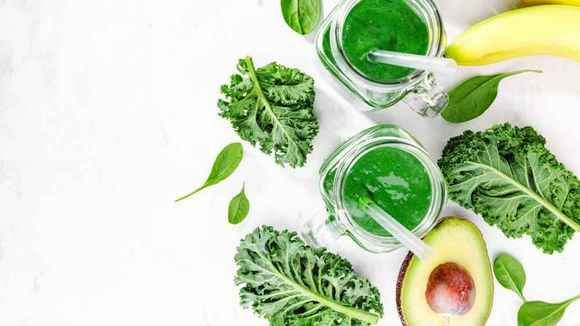Spirulina is extremely rich in multiple nutrients
Spirulina is an organism that grows in both fresh and saltwater. It is a type of cyanobacteria, which is a family of single-celled microbes, often called blue-green algae. Just like plants, cyanobacteria produces energy from sunlight through photosynthesis. [ref. 1]
Spirulina has been consumed since the ancient Aztecs, but became popular again when NASA suggested it could be grown in space for use by astronauts. [ref. 2] The standard daily dose of spirulina is 1-3 grams, but doses up to 10 grams per day are effectively used. This small algae is full of nutrients - one tablespoon (7 grams) of dried spirulina powder contains the following nutrients:
- Protein: 4 grams (the quality of the protein in spirulina is considered excellent - comparable to eggs. It provides all the essential amino acids you need)
- Vitamin B1 (thiamine): 11% of RDA (RDA means dietary reference intake)
- Vitamin B2 (riboflavin): 15% of RDA
- Vitamin B3 (niacin): 4% of RDA
- Honey: 21% of RDA
- Iron: 11% of RDA
- It also contains decent amounts of magnesium, potassium and manganese and small amounts of almost all other nutrients you need.
In only 7 g spirulina contains 20 calories and 1.7 grams of digestible carbohydrates. All this leads some researchers to believe that spirulina may be the most nutritious food on the planet.
Spirulina has powerful antioxidant and anti-inflammatory properties
Oxidative damage can impair your DNA and cells, as well as can cause chronic inflammation that contributes to cancer and other diseases. [ref. 3]
Spirulina is a fantastic source of antioxidants that can protect against oxidative damage. Its main active component is called phycocyanin. This antioxidant substance gives spirulina its unique blue-green color. Phycocyanin can fight free radicals and inhibit the production of inflammatory signaling molecules, providing impressive antioxidant and anti-inflammatory effects.
May lower levels of 'bad' LDL cholesterol and triglycerides
Heart disease is the leading cause of death in the world. Many risk factors are associated with an increased risk of heart disease. As it turns out, spirulina positively affects many of these factors. For example, it can lower total cholesterol, "bad" LDL cholesterol and triglycerides, while raising levels of "good" HDL cholesterol.
In a study of 25 people with type 2 diabetes, 2 grams of spirulina per day significantly improved these markers, and in another study in people with high cholesterol, it was found that 1 gram of spirulina per day lowered triglycerides by 16.3% and "bad" LDL by 10.1%. [ref. 3] And so we get to the next point related to cholesterol levels.
Protects 'bad' LDL cholesterol from oxidation
The fat structures in your body are susceptible to oxidative damage. This phenomenon is known as lipid peroxidation, a key driver of many serious diseases, including atherosclerosis, IBD, asthma, Parkinson's disease, kidney damage, preeclampsia. For example, one of the key steps in the development of heart disease is the oxidation of "bad" LDL cholesterol, and in several studies it has been found that antioxidants in spirulina are especially effective for reducing lipid peroxidation in both humans and animals. [Ref. 5]
Spirulina may have anticancer properties
Some evidence suggests that spirulina has anticancer properties. Animal studies have shown that it can prevent the onset of cancer and reduce the size of the tumor. The effects of spirulina on oral cancer - or mouth cancer - have been particularly well studied. One study examined 87 people from India with pre-cancerous lesions - called oral submuxal fibrosis - in the mouth. Among those who took 1 gram of spirulina per day for a year, 45% saw their lesions disappear - compared to just 7% in the control group. When these people stop taking spirulina, almost half of them have lesions again in the following year. [Ref. 6]
Spirulina may reduce blood pressure
High blood pressure is a major driver of many serious diseases, including heart attacks, strokes and chronic kidney disease. While 1 gram of spirulina is ineffective, a dose of 4.5 grams per day has been shown to reduce blood pressure in people with normal blood pressure levels. [ref. 6] This decrease is thought to be due to increased production of nitric oxide, a signaling molecule that helps your blood vessels relax and dilate.
Spirulina improves symptoms of allergic rhinitis
Allergic rhinitis is characterized by inflammation in the nasal passages and other symptoms such as a stuffed nose, itching, tearful eyes and others. These reactions are triggered by environmental allergens, such as pollen, animal hair or even wheat dust.
Spirulina also contributes here - it is a popular alternative treatment for symptoms of allergic rhinitis, and there is evidence that it can be an effective tool for reducing symptoms such as nasal discharge, sneezing, stuffy nose and itching.
Spirulina can be an effective remedy against anemia
There are many different forms of anemia, the most common being characterized by a decrease in hemoglobin or red blood cells in the blood. In a study of 40 adults with a history of anemia, spirulina supplements increased the hemoglobin content of red blood cells and improved immune function. Keep in mind that this is just one study. More studies are needed before serious conclusions can be drawn. [Ref. 7]

Spirulina Can Improve Muscle Strength and Endurance
Exercise-triggered oxidative damage is a major contributor to muscle fatigue. Some plant foods have antioxidant properties that can help athletes and physically active people reduce this damage. Spirulina may also be useful in this regard, as some studies have shown an improvement in muscle strength and endurance when taking it. [ref. 9]
Spirulina may help control blood sugar
Animal studies have linked spirulina to a significant decrease in blood sugar levels. [ref. 9] In some cases, it outperforms popular diabetes medicines, including metformin. There is also a limited amount of data showing that spirulina may be effective in humans, but more research is needed to confirm the effects.








